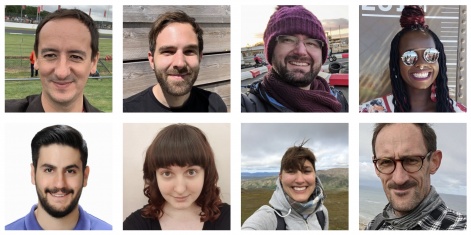As mobile racing games specialist Hutch commences its four-day working week (4DWW) trial, among around 70 UK companies in a campaign launched by 4 Day Week Global, PocketGamer.biz will be onboard to detail the step-by-step progress, successes, and drawbacks experienced by the developer in our feature series, 4DWorks.
Hutch CEO Shaun Rutland outlines why the firm partnered with 4 Day Week Global over the next six months, and how the global games industry has finally pivoted on self-destructive relationships with work.
PocketGamer.biz: I think the central question to this is: why? What is Hutch's – and your – most important driver to embarking on the four-day working week trial?
Shaun Rutland: We’re all about making Hutch a great place to work, because we know this means better games. Joining the trial was a no-brainer for us, as it gives us the opportunity to put this theory to the test.
You don’t have to look far to see that working in the games industry is tough. We’ve been there, facing the burnout and stress in our early careers. That's why we’re a no-crunch business, and the 4DWW is a chance to show the industry that stamping out this awful approach is the only way forward. We want our team to be better rested, energised, and focused. I don’t want to walk into the office and find my team exhausted and barely able to make it through the day. I want to see them happy and motivated, and putting that new energy into their work.

Being part of the trial makes it a much safer space for us to learn. We’ll be able to pick out what works and what doesn’t. We don’t want to force a change that we can’t guarantee will be right for everyone, so the next six months will challenge us to see if our ambitions match up to reality. We want to do this right.
A number of games companies, and some in the mobile space, have also conducted 4DWW trials, not least of all KO_OP and Kitfox Games. Has Hutch been speaking with other games companies about expectations, and what lessons are you taking onboard for your trial?
Not yet, but that comes down to us wanting to work with a similarly sized workforce. Every studio has its own challenges to account for, so there isn’t a one-size-fits-all solution. Kitfox is a great example. They’re a small team, so if someone has an opinion they can get it seen fairly quickly. Smaller companies can be more flexible, particularly if they have smaller overheads to consider.
Hutch, on the other hand, has over 140 people globally that all need to be accounted for. Our approach has to find a way to streamline all of their voices into something manageable. We’ve been working closely with 4 Day Week Global and they’ve been an amazing resource to make sure we’re doing things in the best way.
We’re going to be learning a lot on the way, and mistakes are bound to happen.Shaun Rutland
We’re going to be learning a lot on the way, and mistakes are bound to happen. Honestly, that's what we’re hoping for; to make our own missteps now and find solutions that work for Hutch. We want other companies to learn from us, and to use that knowledge to be more output focused.
Some, including Microsoft Japan and Armor Games, have expressed improved productivity and more sustainable mental health among their teams. What impact and/or projections are you anticipating from the trial?
We’re hoping to see the same thing. It's obvious that a happy team also means you have a productive one, but that's often neglected in games. We’re pretty confident that our trial will show a better rested team is more able to output more. We want to see that extra energy translate to better output from the team across game launches, updates and more.
It's also important for us to stay progressive with our approach, as we did with the introduction of hybrid working 11 years ago, so we continue to attract world class people to the business.
There are a number of other benefits that we’ll be tracking over the trial period; increased sustainability alongside better distribution of caring duties for men and women for example. The results are going to be really important for us in how we shape Hutch going forward.
We’re not going into this with a narrow focus, the more we understand about the impact, the more we can improve overall.
Initiating a 4DWW cannot be done in a uniform way. Certain teams, such as QA, work to different schedules and deadlines. How will Hutch be balancing implementation and/or support systems to ensure any benefits are received by as many teams as possible?

By evaluating each team by their output, it becomes much simpler to find consistent ways of making changes. Businesses need a different mindset when approaching work, which begins with clarity and then transitions to trust. Expectations for roles need to be easily understood, so we can trust the team to deliver in the time allocated. We will be working closely with our teams to ensure that everyone is able to get the most out of trial, unrestricted by their role.
Our entire team has been asked to opt into our 100-80-100 policy, no ones being left behind. That means that everyone will be set up to deliver 100 per cent of the work, in 80 per cent of the time, without any loss of pay. Are there going to be challenges? Yes, of course, we anticipate there will be. But it's our job to make it work.
What data collection and evaluation methods will you be using during the trial?
There’s a ton. Everything from sales data, game releases, team output, and even things like how it impacts the team’s personal electricity bills will be reviewed. Surveys will be given out to the team on a regular basis, so they can share their thoughts with us.
Even things like how it impacts the team’s personal electricity bills will be reviewedShaun Rutland
We’ll be measuring how happy they are and working to understand how the change is felt at home. We want to know if our team is able to use the time to teach their kids to ride a bike, or to pursue a hobby they couldn’t fit in before. It's all an important part of the bigger picture, so our thinking needs to expand alongside this.
For example, if happiness goes up, but productivity drops, we need to know exactly why this has happened and what we need to do. It's not just for us to know, the data will be important for 4 Day Week Global to build their own case for the policy. That data will be given to researchers at Cambridge University, Boston College, and Oxford University for insight, so we need to be thorough.
What has been the initial reception from Hutch team members regarding the 4DWW trial? Were there any parties who felt negatively towards it?
It was positive, but there were concerns. Many are really excited at the prospect of having more free time, but there are some people who worry this could radically change our culture. They don’t want to see Hutch become a less friendly workplace that encourages a competitive “achiever” mindset. The office is a really important place for some to socialise, as they might not have the chance to do so outside of work. If your friends are in the office, a 4DWW is a significant change to your rituals and routines.

We totally understand this, and it's a reality that we have to be aware of. We don’t want our culture to suffer as a result of the trial, so hearing this kind of feedback is essential. It's been awesome to see the happiness about the trial around the office, but we can’t neglect constructive criticism or people's feelings. Anxieties may start to drop off during the trial, but we will be listening to everyone.
For now, at least, the rest of the games industry continues on a five-day working week. How will your external partners be affected by the trial, and what changes are you implementing to address these?
We don’t have any clients as such, as we publish our own games and define our own timelines. Regardless, it can still work in any B2B relationship driven business with the right approach.
As mentioned, it's about being focused on output and not time. Think about how many client meetings eat up time that could be better spent anywhere else. Every business could massively cut down on timesinks if they committed to it, they just need to be more ruthless. If everyone gets on board with this mentality, the transition would be straightforward.
The global workforce is in a period of transition, with many rethinking their relationships with work following the pandemic. The games industry is notorious for burnout, and is experiencing a skills shortage. What changes would you like to see from the wider games industry to ensure it is a more sustainable and supportive environment?
This is exactly why we chose this trial. We strongly believe in changing the way the industry works, ever since the EA Spouse scandal made the extent of the problem clear. It's finally being challenged, but it's still not enough. Rockstar actually bragged about 100 hour weeks during the GTA5 launch. They were called out on this macho 'long hours, aren’t we great' culture during the development of Red Dead: Redemption 2, and this completely backfired for them. Rightfully so, this attitude has plagued our industry for far too long.

But now everything is changing about how we work, some of it good and some of it questionable. Since the pandemic, hybrid working is finally normalised. Remote working is staying, even if we aren’t convinced by full time remote work ourselves. We have to be agile and anticipate the next move. So we ask ourselves, what's next? How do we ensure parents working four days are included as full timers? How do we reduce our environmental impact? How can we create a more caring and attractive workplace that allows our team to focus on making great games?
We kept returning to the 4DWW, over and over again. It appeared to hit everything we wanted to achieve, so we were eager to test it out ourselves. We want to be the change, rather than hoping for it to happen. We know that our close friends in the industry are going to be watching us intently, because they want to succeed.
We want to kill that ‘time is value’ mentality, it's done our industry no favours. We believe in the 4DWW, and we know it can be a big step to making the games industry a better place to work.
---
You can check out each instalment of 4DWorks, exploring Hutch's 4DWW trial throughout the next six months, through this link.






















